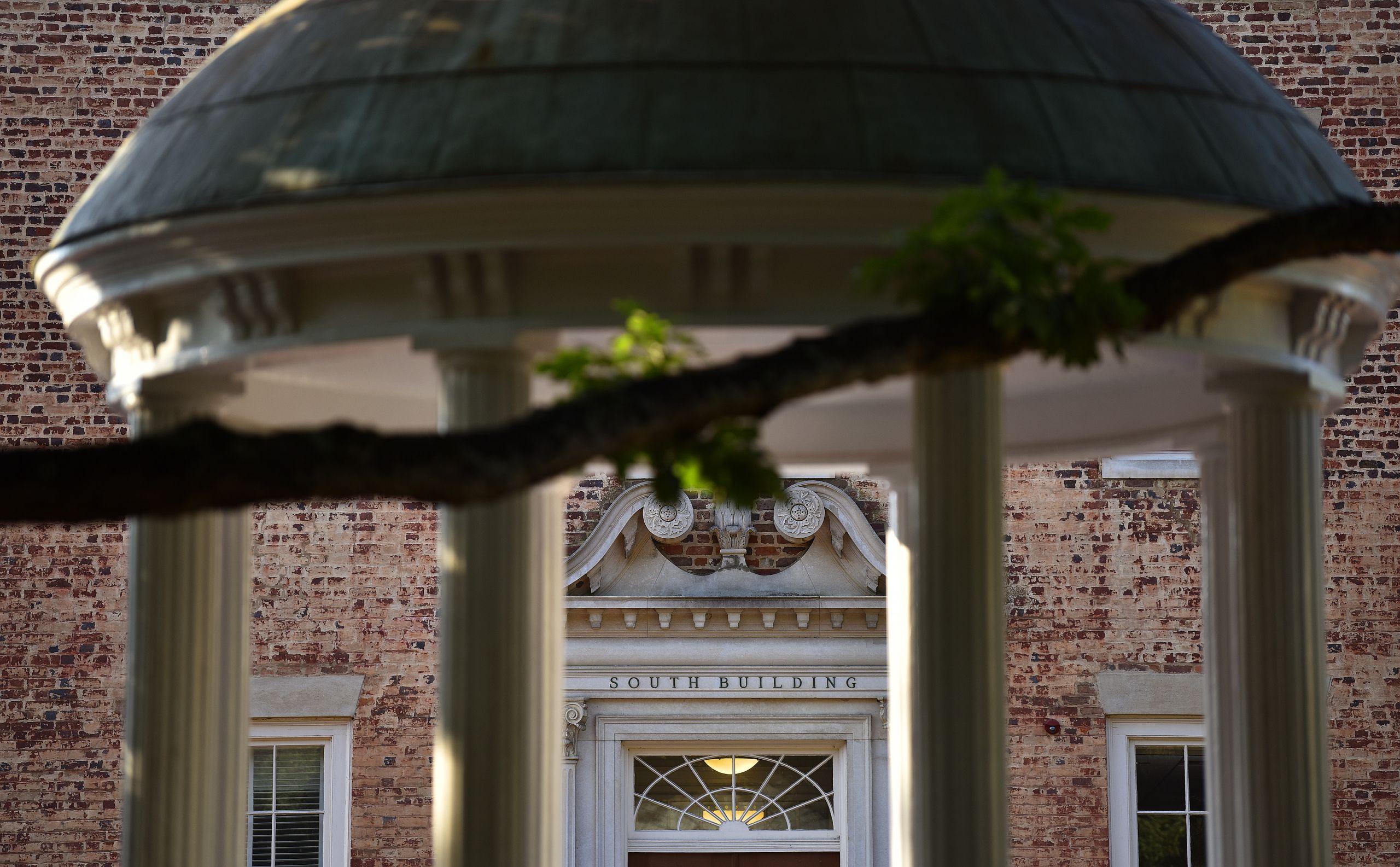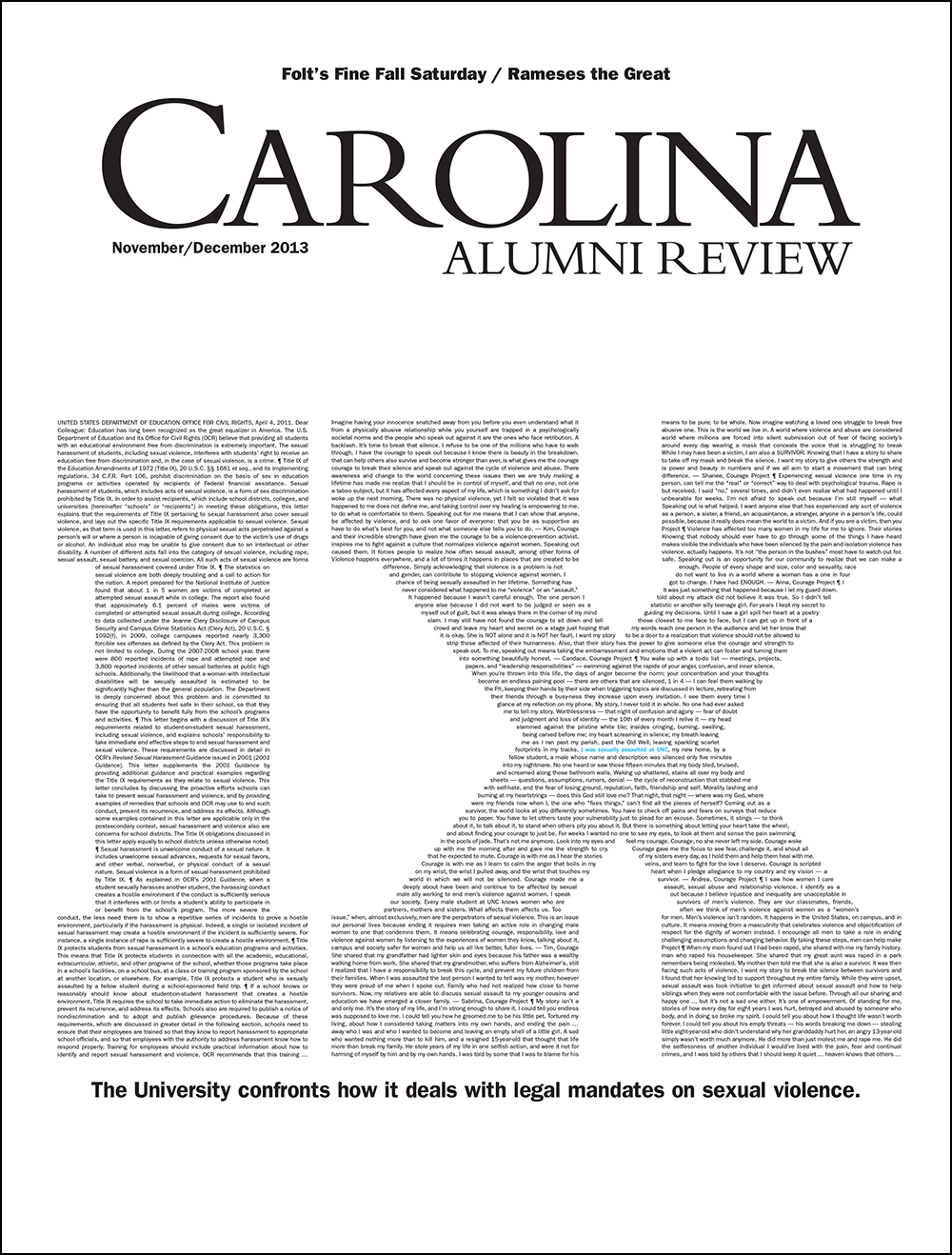Reports of Sexual Assault Incidents Rise in New Survey
Posted on Oct. 16, 2019
Thirty-four percent of respondents said sexual assault or sexual misconduct is “very” to “extremely” problematic at UNC. (File photo)
More than a third of undergraduate women say they were sexually assaulted while at Carolina — the number rises to nearly half for those in their fourth year or higher — according to a new survey.
The overall numbers related to assault and other behaviors such as harassment and stalking are up from a similar survey taken in 2015, and patterns of sexual misconduct do not appear to have changed. At the same time, the study reported that more students understand what sexual assault is and know how to get post-assault help for victims and how to more effectively intervene in sexual misbehavior as it happens.
UNC’s numbers are slightly higher than the average of the 33 universities surveyed by the Association of American Universities, which was closer to one-fourth of undergraduate women saying they were assaulted. The AAU represents 62 of the nation’s top-ranked research universities.
Thirty-four percent of respondents said sexual assault or sexual misconduct is “very” to “extremely” problematic at UNC. That number rose from 25 percent in the 2015 survey.
“The data are very concerning and reinforce what we know to be true both on our campus and across the country: sexual assault and sexual harassment are serious problems that deeply affect our community,” Interim Chancellor Kevin Guskiewicz wrote in a message to the campus community on Oct. 15. “These behaviors have profound physical and emotional effects on the people who experience them and also have lasting impacts on other members of the campus community. And while many of you have been very active in raising awareness and staying engaged in the issue, we need the help of every person — now more than ever — to change our culture.”
The survey defined sexual assault as sexual touching or penetration involving physical force; inability to consent or stop what was happening because the student was passed out, asleep or incapacitated due to drugs or alcohol; coercion; or absence of voluntary agreement.
Thirty-five percent of undergraduate women and 45 percent of those in their fourth year or higher said they had experienced assault in that broad category. Ten percent of undergraduate men said they had experienced assault and almost 15 percent of those in their fourth year or higher. The survey also was broken out by transgender/genderqueer/nonbinary persons, who reported experiencing assault at the rate of 26 percent for undergraduates and 29 percent for those in their fourth year or higher.
The survey had a 20.8 percent response rate among Carolina students.
All those numbers were up slightly from the 2015 survey except for TGQN, which fell 10 percentage points. Developers of the survey cautioned that the questions were somewhat different from those used in 2015 and that for UNC, the 2015 data was not significant statistically.
In the most serious category, 19.7 percent of undergraduate women said they experienced unwanted acts of penetration; 26.9 percent for those in their fourth year or higher.
Among other takeaways:
• The offender most often is another student; frequently the offender is someone the student knows;
• 57 percent said the offender was drinking alcohol before the incident;
• More than 63 percent said that they were drinking before the incident; and
• More than 9 percent said they were certain or suspected that they were given alcohol or another drug without their knowledge or consent.
The University began requiring an online sexual assault training module for students about four years ago. More than 80 percent of respondents reported having taken a training module or information session since arriving at UNC. Most of them reported that the training covered how sexual assault or other sexual misconduct is defined on campus and that the training covered where to seek help.
UNC, like many universities, has struggled with the assault issue. It was one of the starting points of what became a network of assault victims across the country who called out their schools on what they saw as often poorly focused, overworked and poorly trained counselors, investigators, health care providers, police and adjudicators in uncoordinated patchworks of offices and agencies.
The University began to significantly beef up resources to deal with victims and perpetrators some six years ago. But four complaints filed against the effectiveness of the programs yielded a decision from the U.S. Department of Education’s Office of Civil Rights in 2018 after it found that the University failed to respond promptly to some sexual assault and sexual harassment complaints because staff were not adequately trained to do so and that UNC failed to adopt and publish grievance procedures for the prompt and equitable resolution of student, employee and third-party complaints alleging discrimination on the basis of sex.
OCR acknowledged that changes put in place after the complaints were filed had improved UNC’s handing of sexual harassment cases: “During the course of its investigation, OCR recognizes that the University has been proactive regarding its efforts to maintain a campus environment free from discrimination, harassment, and related misconduct, including sexual violence and sexual assault, including through strengthening its Title IX response policies, procedures, resources, and outreach.”
Guskiewicz said on Tuesday that “within the next month, we will convene a coalition of students, faculty and staff to help us develop a comprehensive strategy for prevention and awareness.”
The University’s summary of the survey said that it must identify ways to strengthen bystander intervention skills, and that “consent education must be at the forefront of our attention.”
More at safe.unc.edu/create-change/aausurvey2019.
More:
• “Office of Civil Rights Cites UNC Failures in Handling Sexual Assault,” July 2018
• Student’s Sexual Assault Claim Turns Attention to UNC Policy, September 2016
• University Refines Policies on Sexual Violence, August 2014
• “Sexual Assault and the Law,” cover story, November/December 2013 Carolina Alumni Review
• Task Force to Review How UNC Handles Sexual Assault Complaints, May 2013
• Timeline of Events: An investigation of Handling Sexual Assault Cases, April 2013
• Carolina Creates Full-Time Title IX Post, Names Interim, April 2013
• Feds Will Probe Handling of Sexual Misconduct Case, March 2013

The Review received four CASE District 3 awards related to its November/December 2013 cover story, titled “Sexual Assault and the Law”:
• Grand Award in Graphic Design for the cover, seen at left. (The words inside the “I” of Title IX were from the letter from the U.S. Department of Education warning colleges to improve their prevention of and response to sexual assaults involving students. The words in the “X” were from essays about sexual violence featured in UNC’s The Courage Project.)
• Grand Award in Publications Writing
• Award of Excellence in Best Articles of the Year
• Special Merit Award in Feature Writing
